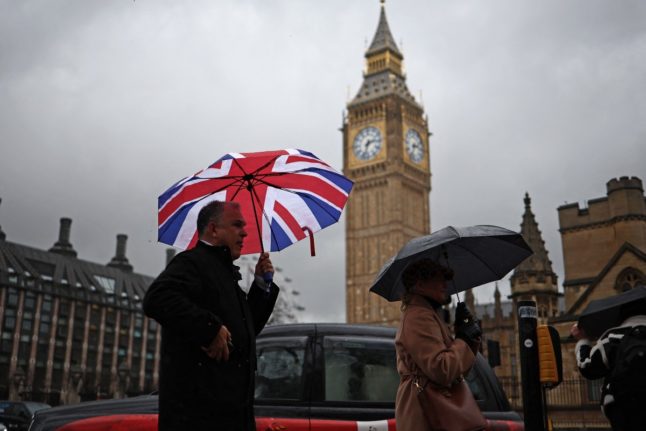British citizens who intend to move to the UK with a foreign partner have to meet several requirements to make their plans a reality. If they apply for a partner visa, one of the requirements is having a minimum income showing they can support their spouse without relying on the social security system.
Other European countries impose similar rules, but meeting such demand in the UK is particularly difficult, and it will be even more so with the salary threshold increasing on April 11th.
When the UK was part of the European Union, British citizens could move back to the UK with their EU and non-EU partners without such requirements under EU free movement rules. But because immigration policies are a national matter, these rights were not preserved under the EU-UK withdrawal agreement.
Despite not being protected by the EU-UK withdrawal agreement, the UK granted Britons living in the EU a ‘grace period’, until March 30th 2022, to return to the UK with foreign spouses and receive status under the EU Settlement Scheme. After that date, British nationals who return to the UK from the EU with a non-UK partner are also subject to these visa and income requirement rules.
Immigration barriers
The minimum income requirement (MIR) was established in 2012 as part of the toughening of UK immigration policies. British citizens (plus EU/EEA nationals with pre-settled status) need to have a wage with a sufficient annual income in order for them to be able to sponsor their foreign partner’s visa. In other words if they want their partner to come with them, they need to earn a certain amount. This has left Britons living in Europe feeling as though they are “locked abroad” and in “exile”.
READ ALSO: ‘I feel exiled’: Britons in Europe locked abroad with foreign partners
The minimum income up until now was set at £18,600 (€21,700), or £22,400 (€26,100) if the couple had one child, plus another £2,400 (€2,800)for each other child.
But these income requirements will rise steeply from April 11th 2024.
This policy has not been equality impact assessed and discriminates against women and poorer British citizens.
— Art (@Art93319672) January 11, 2024
From this date the minimum a British national or long-term resident will need to earn if they want to return home will increase to £29,000 (€33,800) and up to £38,000 (€44,313) by spring 2025, although there will no longer be an additional amount for accompanying children. Alternatively, families have needed to prove they have at least £62,500 (€72,884) in cash, which from 11 April will increase to £88,500 (€103,207).
Anyone who applied before April 11th won’t be affected by the rise.
“This will ensure people only bring dependants to the UK they can support financially,” the UK government has said.
The minimum income is not the only requirement to secure a spouse visa for a non-UK partner and children.
There are visa fees (£1,846 for applications from outside the UK or £1,048 from within) and the immigration health surcharge, which increased on 6 February from £624 to £1,035 for adults and from £470 to £776 for under 18s per year.
In addition, they need to have adequate accommodation and the foreign spouse needs to prove that they have a good knowledge of English.
“The rules are complex and even applicants who fulfil all the requirements struggle to tick all the boxes needed in order to be successful,” Anna Hawkes, Legal Services Manager at UK-based law firm Seraphus, told The Local.
How the MIR works
When it comes to the minimum income requirement, if the sponsoring partner is employed and has been employed for more than six months with the same UK employer, he or she must prove six months of earnings that would make up the equivalent to an annual salary of £18,600, soon £29,000. If the sponsor has not been with the same employer in the UK for six months, he or she will need to show earnings over the threshold in the 12 months before the application.
It the employment is outside the UK, in addition to the earnings, the sponsors have to show they will keep the income they have had abroad after moving to the UK (for example if they are digital nomads) or that they have a job offer in the UK.
Non-employment income, such as property rentals, dividends, royalties, interests, maintenance payments from former partners, pensions or allowances, also counts, but proof is required for 12 months.
If the sponsor is self-employed or the director of a limited company, the income will be that of the last full financial year (which runs from April 6th to April 5th) or the average from the last two financial years. What counts is the gross taxable profit.
If the minimum income requirement is not met, the sponsor or the applicant or both combined need to show they have sufficient cash savings. These amount to the minimum income requirement multiplied by 2.5 and added to £16,000. This currently makes £62,500, but from 11 April it will be £88,500.
Another alternative is for the partner to seek another visa route, for example through their employment.
If requirements cannot be met, it is possible to apply for the right to remain in the UK on the basis of ‘exceptional circumstances’, for instance when it would not be reasonable to expect a child under 18 to leave the UK or if there are “insurmountable obstacles to family life” with a partner staying outside the UK.
It is also possible to request a court to recognise the right to family life under the European Convention on Human Rights. If the family is living abroad, the reasons why they need to return to the UK will be taken into consideration if ‘exceptional circumstances’ is argued, legal specialist Hawkes explains.
This could be for example if a close family member in the UK needs care.
As regards the timing for processing applications, it currently takes around 24 weeks (around 8 weeks if applying from the UK) to obtain a decision when applying from abroad, says Anna Hawkes.
“Applicants should be able to pay for priority service in order to get a decision in 6 weeks. However, it can differ from individual visa centres so it will depend on where the applicant lives,” she added.
A petition on the UK parliament website asks the government to reconsider the minimum income policy. If it reaches 100,000 signatures, it will have to be debated in parliament.
This article has been produced by Europe Street news.



 Please whitelist us to continue reading.
Please whitelist us to continue reading.
Member comments